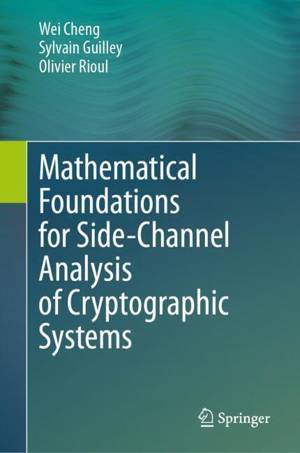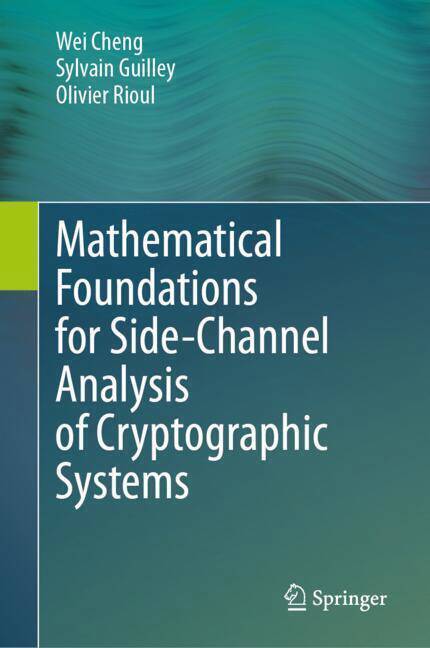
- Afhalen na 1 uur in een winkel met voorraad
- Gratis thuislevering in België vanaf € 30
- Ruim aanbod met 7 miljoen producten
- Afhalen na 1 uur in een winkel met voorraad
- Gratis thuislevering in België vanaf € 30
- Ruim aanbod met 7 miljoen producten
Mathematical Foundations for Side-Channel Analysis of Cryptographic Systems
Wei Cheng, Sylvain Guilley, Olivier RioulOmschrijving
This book offers the reader a formalization, characterization and quantification of the real threat level posed by side-channel leaks from devices implementing cryptography. It exploits the best mathematical tools for quantifying information leakage and characterizing leakage-based attacks. The two possible approaches are described in detail. This includes the optimal attack strategy that can be derived (in specific contexts) or generic bounds regarding data complexity that can be computed. The tone of this book is essentially mathematical. It aims to establish formal foundations for techniques that are otherwise used as engineering recipes in industrial laboratories or empirical intuitions for deriving security levels from practical implementations. It is a systematization of knowledge and a compilation of relevant tools relating to the practice of side-channel analysis on embedded systems.
This book provides an up-to-date and improved analysis and understanding of embedded devices that conceal secrets that can be extracted by an attacker. Typical attacks involve measuring the device's power consumption or radiated electromagnetic field. As a source of noisy information, this correlates it with secrets and enabling these secrets to be retrieved. The attacker in some cases, can purchase a blank device from the same series and learn about its leakage, particularly how it relates to the secrets. This book also covers how such information can enhance hardware attacks deployed on another device.
Researchers and engineers working in the field of side-channel security for embedded systems and related countermeasures as well as hardware and software engineers focused on implementing cryptographic functionalities will want to purchase this book as a reference. Advanced-level students majoring in computer science and electrical engineering will find this book valuable as a secondary textbook.
Specificaties
Betrokkenen
- Auteur(s):
- Uitgeverij:
Inhoud
- Aantal bladzijden:
- 411
- Taal:
- Engels
Eigenschappen
- Productcode (EAN):
- 9783031643989
- Verschijningsdatum:
- 26/10/2024
- Uitvoering:
- Hardcover
- Formaat:
- Genaaid
- Afmetingen:
- 156 mm x 234 mm
- Gewicht:
- 766 g

Alleen bij Standaard Boekhandel
Beoordelingen
We publiceren alleen reviews die voldoen aan de voorwaarden voor reviews. Bekijk onze voorwaarden voor reviews.











